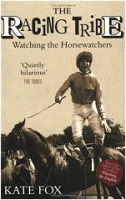
 WATCHING THE ENGLISH by KATE FOX (hier online bestellen)
WATCHING THE ENGLISH by KATE FOX (hier online bestellen)
This is a MUST for every teacher of English!!!!!!!!!!!!!!!!!!!!!!!
Hardly ever before have I read such a good book on the behaviour of English people. In fact, I should have read it
much earlier, but unfortunately Kate Fox didn't publish her book ealier than 2005....
Being an anthropologist, she has obeserved the English in all walks of life: at work, in pubs, at weddings,
on the road, queueing at a bus stop, having meals, at shops. When ever she can, she compares the behaviour of the English as
to their affiliation of class. She maintains that the class system can be observed today as it could in the past.
Read an excerpt from the book, in which Kate Fox describe how English behave in a restaurant where they are totally
dissatisfied with their food:
"The Silent Complaint
Most English people, faced with unappetizing or even inedible food,
are too embarrassed to complain at all. Complaining would be 'making
a scene', 'making a fuss' or 'drawing attention to oneself' in public -
all forbidden by the unwritten rules. It would involve a confrontation,
an emotional engagement with another human being, which is
unpleasant and uncomfortable and to be avoided if at all possible.
English customers may moan indignantly to their companions, push
the offending food to the side of their plate and pull disgusted faces at
each other, but when the waiter asks if everything is all right they smile
politely, avoiding eye contact, and mutter, 'Yes, fine, thanks.' Standing
in a slow queue at a pub or cafe food counter, they sigh heavily, fold
their arms, tap their feet and look pointedly at their watches, but never
actually cornplain. They will not go back to that establishment, and
will tell all their friends how awful it is, but the poor publican or restaurateur
will never even know that there was anything amiss."
Read what Kate Fox means by the 'social dis-ease' (see quotation below) English people suffer from and what
the 'facilitators' are by which the English try to overcome their social dis-ease. You'll
also learn to find the subleties by which English people can determine which class one belongs to.
Read about fair play, the rule of 'not being earnest', the English humour andhow difficult it can
even be for Americans to understand the behaviour of English business people.
Find out the reasons why the English sitting directly at the bar are more likely to talk to you
than if your were sitting in some distance from the bar. Or what is the hidden rule about round buying in
a pub?
Excerpt:
"The Core: Social Dis-ease
The central 'core' of Englishness. Social dis-ease is a shorthand term for all out chronic social inhibitions and handicaps. The English social dis-ease is a congenital disorder, bordering on a sort of sub-clinical combination of autism and agoraphobia (the politically correct euphemism would be 'socially challenged'). It is out lack of ease, discomfort and incompetence in the field (minefield) of social interaction; our embarrassment, insularity, awkwardness, perverse obliqueness, emotional constipation, fear of intimacy and general inability to engage in a normal and straightforward fashion with other human beings. When we feel uncomfortable in social situations (that is, most of the time) we either become over-polite, buttoned up and awkwardly restrained or loud, loutish, crude, violent and generally obnoxious. Both out famous 'English reserve' and out infamous 'English hooliganism' are symptoms of this social dis-ease, as is our obsession with privacy.
Sorne of us are rnore severely afflicted than others. The dis-ease is treatable (temporary alleviation/remission can be achieved using props and facilitators - pubs, clubs, weather-speak, cyberspace, pets, etc.
- and/or ritual, alcohol, magic words and other rnedications and we enjoy periods of 'natural' remission in private and arnong intimates, but it is never entirely curable. Most peculiarities of English behaviour
are traceable, either directly or indirectly, to this unfortunate affliction.
Key phrases include: 'An Englishman's home is his castle'; 'Nice day,
isn't it?'; 'Oi -what You looking at?; , Mind your own business'; 'I don't
like to pry, but ....' - 'Don't make a fuss/scene'; 'Don't draw attention
to yourself'; 'Keep yourself to yourself'; "Ere we go, 'ere we go'; 'Eng-er-land! Eng-er-land! Eng-er-land!."
More works from the same author:
|


